Criminal Law Essay: Actus Reus, Mens Rea, and Criminal Liability
VerifiedAdded on 2020/02/03
|9
|2912
|265
Essay
AI Summary
This essay delves into the fundamental principles of criminal law, focusing on the doctrines of Actus Reus (the guilty act) and Mens Rea (the guilty mind). It examines the interplay between these two elements in establishing criminal liability, discussing how different offenses define Mens Rea and how the law addresses related issues. The essay explores specific offenses like murder and fraud, analyzing how the law assesses dishonesty and intent. It also differentiates between behavior and result crimes, basic and specific intent, and the concept of strict and absolute liability. The essay provides an overview of how courts interpret statutes to determine whether Mens Rea is required or if strict liability applies, considering factors such as social concern and public safety. Additionally, it discusses the arguments for and against strict liability, highlighting its impact on efficiency and fairness within the legal system, and concluding with a nuanced perspective on its appropriate application.
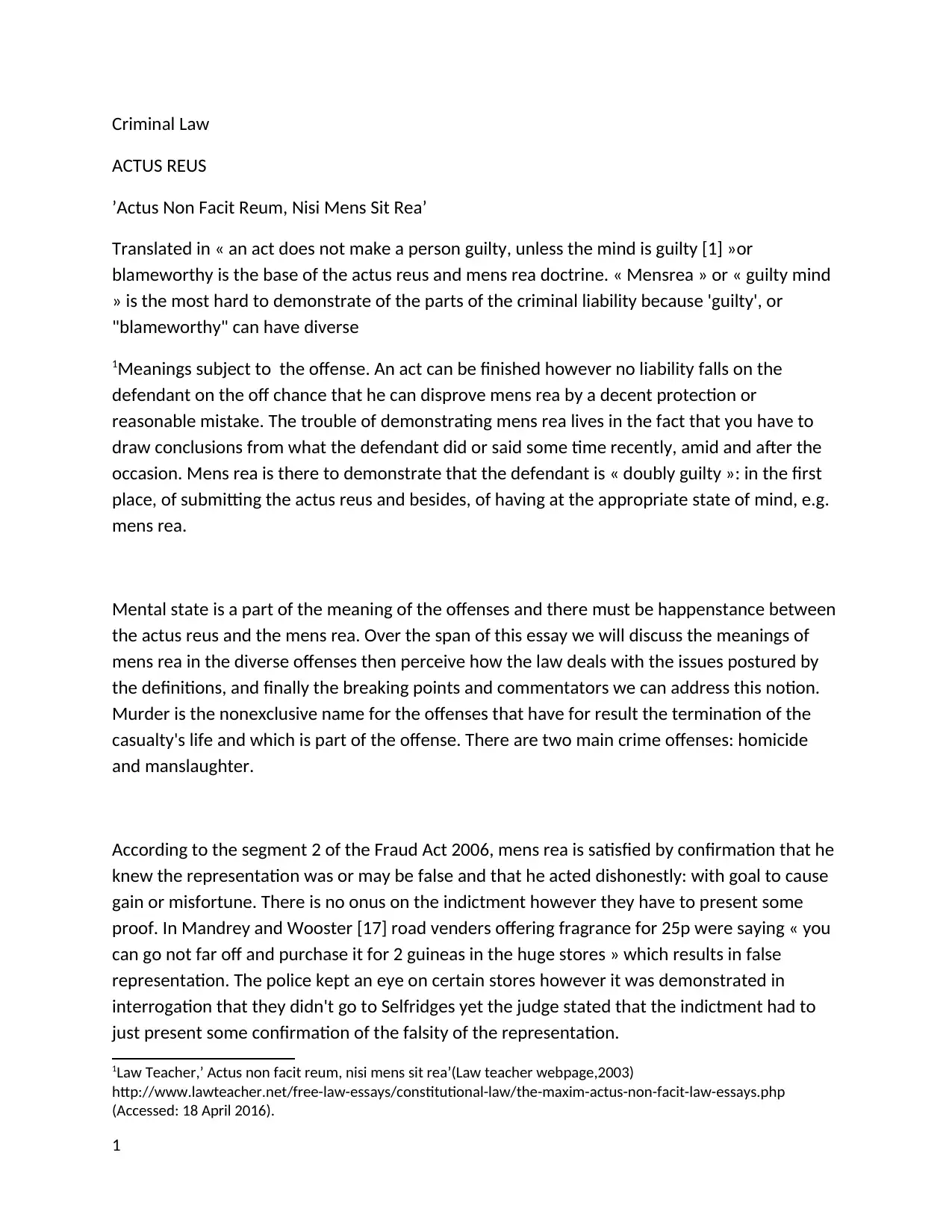
Criminal Law
ACTUS REUS
’Actus Non Facit Reum, Nisi Mens Sit Rea’
Translated in « an act does not make a person guilty, unless the mind is guilty [1] »or
blameworthy is the base of the actus reus and mens rea doctrine. « Mensrea » or « guilty mind
» is the most hard to demonstrate of the parts of the criminal liability because 'guilty', or
"blameworthy" can have diverse
1Meanings subject to the offense. An act can be finished however no liability falls on the
defendant on the off chance that he can disprove mens rea by a decent protection or
reasonable mistake. The trouble of demonstrating mens rea lives in the fact that you have to
draw conclusions from what the defendant did or said some time recently, amid and after the
occasion. Mens rea is there to demonstrate that the defendant is « doubly guilty »: in the first
place, of submitting the actus reus and besides, of having at the appropriate state of mind, e.g.
mens rea.
Mental state is a part of the meaning of the offenses and there must be happenstance between
the actus reus and the mens rea. Over the span of this essay we will discuss the meanings of
mens rea in the diverse offenses then perceive how the law deals with the issues postured by
the definitions, and finally the breaking points and commentators we can address this notion.
Murder is the nonexclusive name for the offenses that have for result the termination of the
casualty's life and which is part of the offense. There are two main crime offenses: homicide
and manslaughter.
According to the segment 2 of the Fraud Act 2006, mens rea is satisfied by confirmation that he
knew the representation was or may be false and that he acted dishonestly: with goal to cause
gain or misfortune. There is no onus on the indictment however they have to present some
proof. In Mandrey and Wooster [17] road venders offering fragrance for 25p were saying « you
can go not far off and purchase it for 2 guineas in the huge stores » which results in false
representation. The police kept an eye on certain stores however it was demonstrated in
interrogation that they didn't go to Selfridges yet the judge stated that the indictment had to
just present some confirmation of the falsity of the representation.
1Law Teacher,’ Actus non facit reum, nisi mens sit rea’(Law teacher webpage,2003)
http://www.lawteacher.net/free-law-essays/constitutional-law/the-maxim-actus-non-facit-law-essays.php
(Accessed: 18 April 2016).
1
ACTUS REUS
’Actus Non Facit Reum, Nisi Mens Sit Rea’
Translated in « an act does not make a person guilty, unless the mind is guilty [1] »or
blameworthy is the base of the actus reus and mens rea doctrine. « Mensrea » or « guilty mind
» is the most hard to demonstrate of the parts of the criminal liability because 'guilty', or
"blameworthy" can have diverse
1Meanings subject to the offense. An act can be finished however no liability falls on the
defendant on the off chance that he can disprove mens rea by a decent protection or
reasonable mistake. The trouble of demonstrating mens rea lives in the fact that you have to
draw conclusions from what the defendant did or said some time recently, amid and after the
occasion. Mens rea is there to demonstrate that the defendant is « doubly guilty »: in the first
place, of submitting the actus reus and besides, of having at the appropriate state of mind, e.g.
mens rea.
Mental state is a part of the meaning of the offenses and there must be happenstance between
the actus reus and the mens rea. Over the span of this essay we will discuss the meanings of
mens rea in the diverse offenses then perceive how the law deals with the issues postured by
the definitions, and finally the breaking points and commentators we can address this notion.
Murder is the nonexclusive name for the offenses that have for result the termination of the
casualty's life and which is part of the offense. There are two main crime offenses: homicide
and manslaughter.
According to the segment 2 of the Fraud Act 2006, mens rea is satisfied by confirmation that he
knew the representation was or may be false and that he acted dishonestly: with goal to cause
gain or misfortune. There is no onus on the indictment however they have to present some
proof. In Mandrey and Wooster [17] road venders offering fragrance for 25p were saying « you
can go not far off and purchase it for 2 guineas in the huge stores » which results in false
representation. The police kept an eye on certain stores however it was demonstrated in
interrogation that they didn't go to Selfridges yet the judge stated that the indictment had to
just present some confirmation of the falsity of the representation.
1Law Teacher,’ Actus non facit reum, nisi mens sit rea’(Law teacher webpage,2003)
http://www.lawteacher.net/free-law-essays/constitutional-law/the-maxim-actus-non-facit-law-essays.php
(Accessed: 18 April 2016).
1
Paraphrase This Document
Need a fresh take? Get an instant paraphrase of this document with our AI Paraphraser
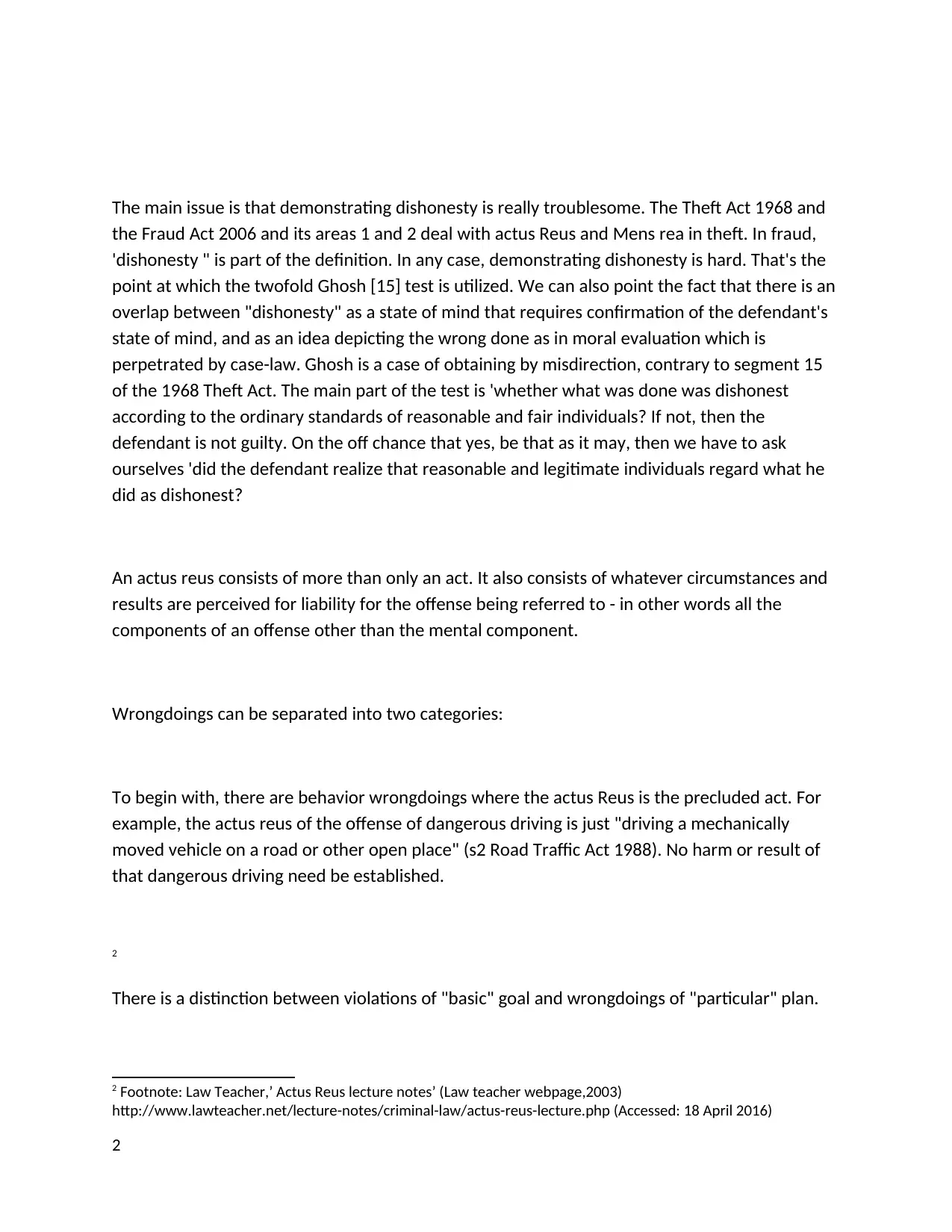
The main issue is that demonstrating dishonesty is really troublesome. The Theft Act 1968 and
the Fraud Act 2006 and its areas 1 and 2 deal with actus Reus and Mens rea in theft. In fraud,
'dishonesty " is part of the definition. In any case, demonstrating dishonesty is hard. That's the
point at which the twofold Ghosh [15] test is utilized. We can also point the fact that there is an
overlap between "dishonesty" as a state of mind that requires confirmation of the defendant's
state of mind, and as an idea depicting the wrong done as in moral evaluation which is
perpetrated by case-law. Ghosh is a case of obtaining by misdirection, contrary to segment 15
of the 1968 Theft Act. The main part of the test is 'whether what was done was dishonest
according to the ordinary standards of reasonable and fair individuals? If not, then the
defendant is not guilty. On the off chance that yes, be that as it may, then we have to ask
ourselves 'did the defendant realize that reasonable and legitimate individuals regard what he
did as dishonest?
An actus reus consists of more than only an act. It also consists of whatever circumstances and
results are perceived for liability for the offense being referred to - in other words all the
components of an offense other than the mental component.
Wrongdoings can be separated into two categories:
To begin with, there are behavior wrongdoings where the actus Reus is the precluded act. For
example, the actus reus of the offense of dangerous driving is just "driving a mechanically
moved vehicle on a road or other open place" (s2 Road Traffic Act 1988). No harm or result of
that dangerous driving need be established.
2
There is a distinction between violations of "basic" goal and wrongdoings of "particular" plan.
2 Footnote: Law Teacher,’ Actus Reus lecture notes’ (Law teacher webpage,2003)
http://www.lawteacher.net/lecture-notes/criminal-law/actus-reus-lecture.php (Accessed: 18 April 2016)
2
the Fraud Act 2006 and its areas 1 and 2 deal with actus Reus and Mens rea in theft. In fraud,
'dishonesty " is part of the definition. In any case, demonstrating dishonesty is hard. That's the
point at which the twofold Ghosh [15] test is utilized. We can also point the fact that there is an
overlap between "dishonesty" as a state of mind that requires confirmation of the defendant's
state of mind, and as an idea depicting the wrong done as in moral evaluation which is
perpetrated by case-law. Ghosh is a case of obtaining by misdirection, contrary to segment 15
of the 1968 Theft Act. The main part of the test is 'whether what was done was dishonest
according to the ordinary standards of reasonable and fair individuals? If not, then the
defendant is not guilty. On the off chance that yes, be that as it may, then we have to ask
ourselves 'did the defendant realize that reasonable and legitimate individuals regard what he
did as dishonest?
An actus reus consists of more than only an act. It also consists of whatever circumstances and
results are perceived for liability for the offense being referred to - in other words all the
components of an offense other than the mental component.
Wrongdoings can be separated into two categories:
To begin with, there are behavior wrongdoings where the actus Reus is the precluded act. For
example, the actus reus of the offense of dangerous driving is just "driving a mechanically
moved vehicle on a road or other open place" (s2 Road Traffic Act 1988). No harm or result of
that dangerous driving need be established.
2
There is a distinction between violations of "basic" goal and wrongdoings of "particular" plan.
2 Footnote: Law Teacher,’ Actus Reus lecture notes’ (Law teacher webpage,2003)
http://www.lawteacher.net/lecture-notes/criminal-law/actus-reus-lecture.php (Accessed: 18 April 2016)
2
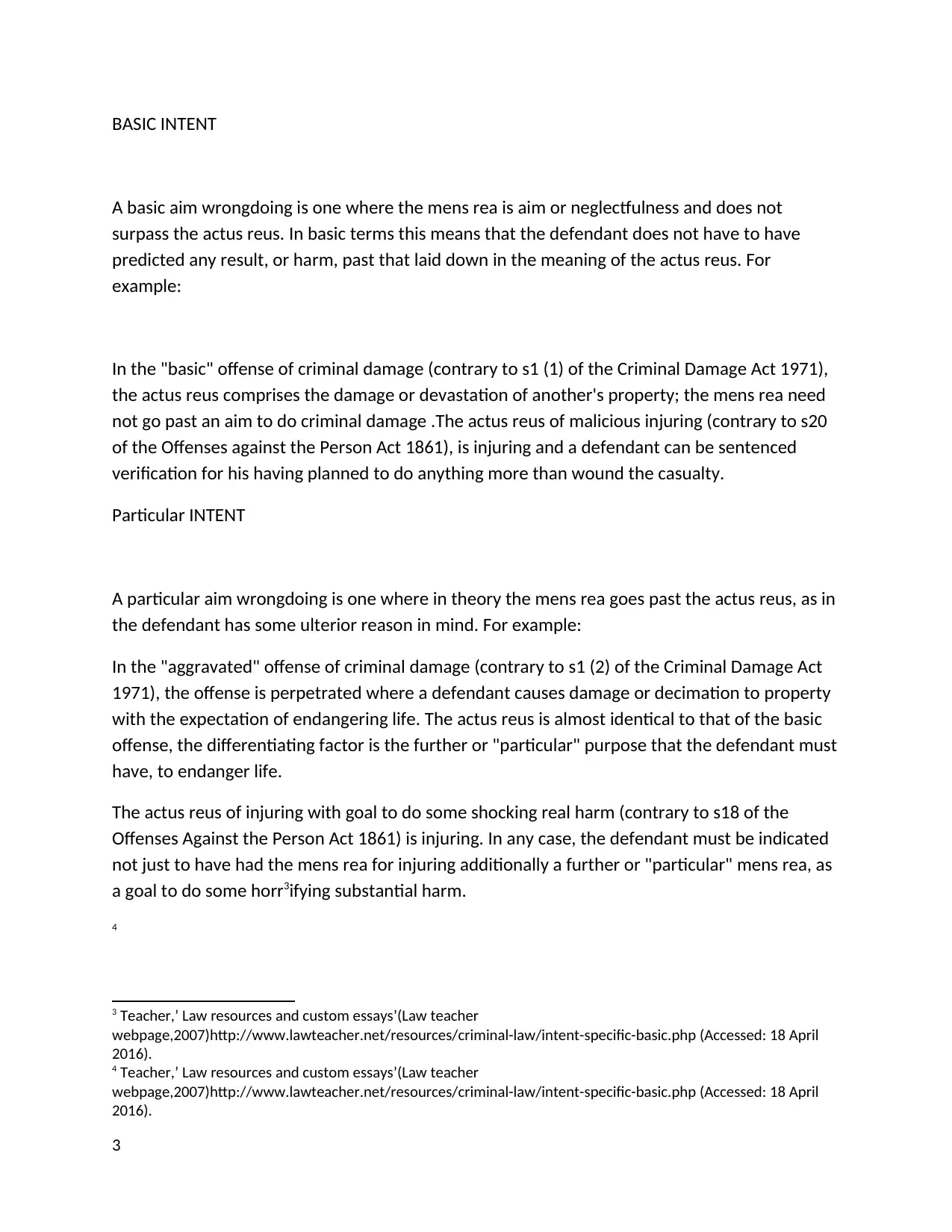
BASIC INTENT
A basic aim wrongdoing is one where the mens rea is aim or neglectfulness and does not
surpass the actus reus. In basic terms this means that the defendant does not have to have
predicted any result, or harm, past that laid down in the meaning of the actus reus. For
example:
In the "basic" offense of criminal damage (contrary to s1 (1) of the Criminal Damage Act 1971),
the actus reus comprises the damage or devastation of another's property; the mens rea need
not go past an aim to do criminal damage .The actus reus of malicious injuring (contrary to s20
of the Offenses against the Person Act 1861), is injuring and a defendant can be sentenced
verification for his having planned to do anything more than wound the casualty.
Particular INTENT
A particular aim wrongdoing is one where in theory the mens rea goes past the actus reus, as in
the defendant has some ulterior reason in mind. For example:
In the "aggravated" offense of criminal damage (contrary to s1 (2) of the Criminal Damage Act
1971), the offense is perpetrated where a defendant causes damage or decimation to property
with the expectation of endangering life. The actus reus is almost identical to that of the basic
offense, the differentiating factor is the further or "particular" purpose that the defendant must
have, to endanger life.
The actus reus of injuring with goal to do some shocking real harm (contrary to s18 of the
Offenses Against the Person Act 1861) is injuring. In any case, the defendant must be indicated
not just to have had the mens rea for injuring additionally a further or "particular" mens rea, as
a goal to do some horr3ifying substantial harm.
4
3 Teacher,’ Law resources and custom essays’(Law teacher
webpage,2007)http://www.lawteacher.net/resources/criminal-law/intent-specific-basic.php (Accessed: 18 April
2016).
4 Teacher,’ Law resources and custom essays’(Law teacher
webpage,2007)http://www.lawteacher.net/resources/criminal-law/intent-specific-basic.php (Accessed: 18 April
2016).
3
A basic aim wrongdoing is one where the mens rea is aim or neglectfulness and does not
surpass the actus reus. In basic terms this means that the defendant does not have to have
predicted any result, or harm, past that laid down in the meaning of the actus reus. For
example:
In the "basic" offense of criminal damage (contrary to s1 (1) of the Criminal Damage Act 1971),
the actus reus comprises the damage or devastation of another's property; the mens rea need
not go past an aim to do criminal damage .The actus reus of malicious injuring (contrary to s20
of the Offenses against the Person Act 1861), is injuring and a defendant can be sentenced
verification for his having planned to do anything more than wound the casualty.
Particular INTENT
A particular aim wrongdoing is one where in theory the mens rea goes past the actus reus, as in
the defendant has some ulterior reason in mind. For example:
In the "aggravated" offense of criminal damage (contrary to s1 (2) of the Criminal Damage Act
1971), the offense is perpetrated where a defendant causes damage or decimation to property
with the expectation of endangering life. The actus reus is almost identical to that of the basic
offense, the differentiating factor is the further or "particular" purpose that the defendant must
have, to endanger life.
The actus reus of injuring with goal to do some shocking real harm (contrary to s18 of the
Offenses Against the Person Act 1861) is injuring. In any case, the defendant must be indicated
not just to have had the mens rea for injuring additionally a further or "particular" mens rea, as
a goal to do some horr3ifying substantial harm.
4
3 Teacher,’ Law resources and custom essays’(Law teacher
webpage,2007)http://www.lawteacher.net/resources/criminal-law/intent-specific-basic.php (Accessed: 18 April
2016).
4 Teacher,’ Law resources and custom essays’(Law teacher
webpage,2007)http://www.lawteacher.net/resources/criminal-law/intent-specific-basic.php (Accessed: 18 April
2016).
3
⊘ This is a preview!⊘
Do you want full access?
Subscribe today to unlock all pages.

Trusted by 1+ million students worldwide
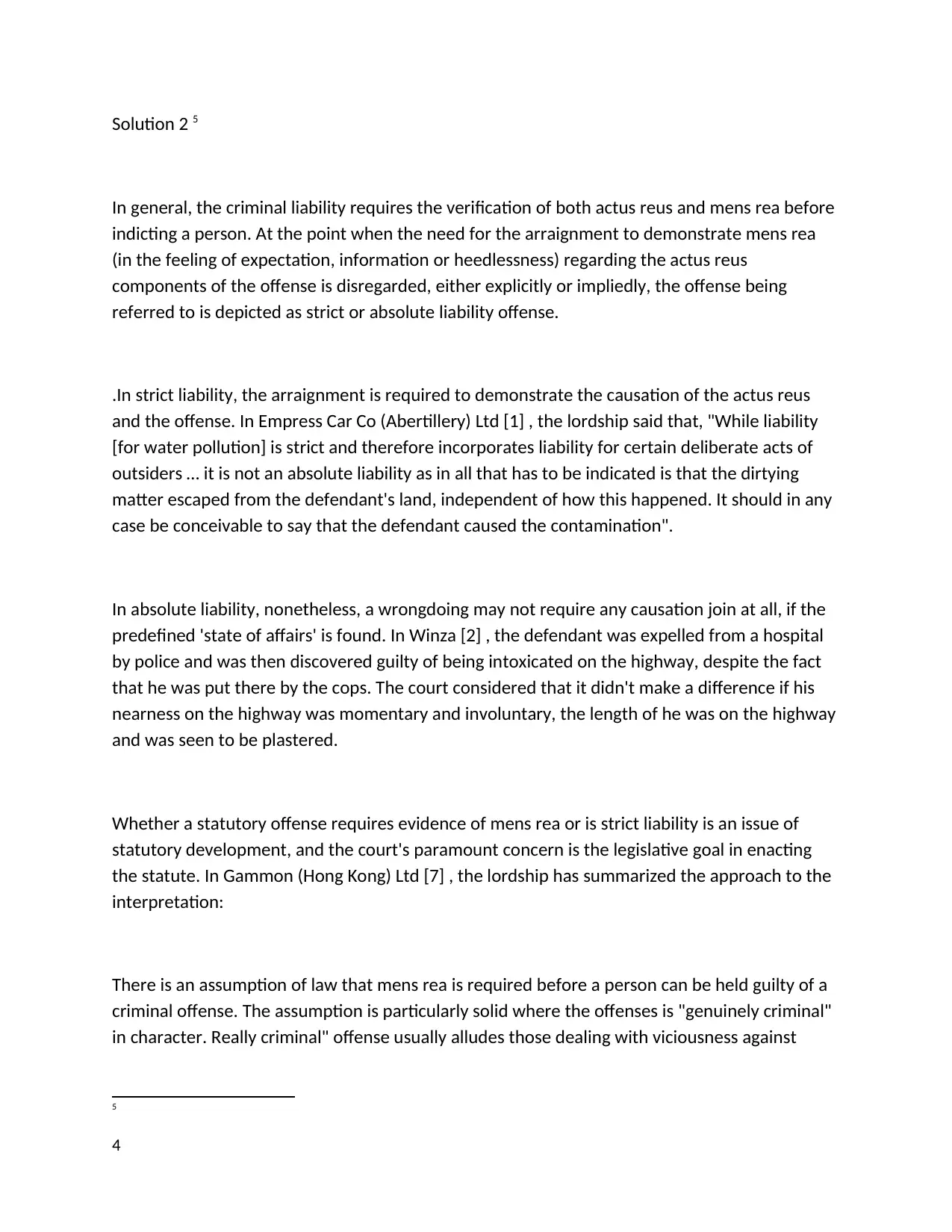
Solution 2 5
In general, the criminal liability requires the verification of both actus reus and mens rea before
indicting a person. At the point when the need for the arraignment to demonstrate mens rea
(in the feeling of expectation, information or heedlessness) regarding the actus reus
components of the offense is disregarded, either explicitly or impliedly, the offense being
referred to is depicted as strict or absolute liability offense.
.In strict liability, the arraignment is required to demonstrate the causation of the actus reus
and the offense. In Empress Car Co (Abertillery) Ltd [1] , the lordship said that, "While liability
[for water pollution] is strict and therefore incorporates liability for certain deliberate acts of
outsiders … it is not an absolute liability as in all that has to be indicated is that the dirtying
matter escaped from the defendant's land, independent of how this happened. It should in any
case be conceivable to say that the defendant caused the contamination".
In absolute liability, nonetheless, a wrongdoing may not require any causation join at all, if the
predefined 'state of affairs' is found. In Winza [2] , the defendant was expelled from a hospital
by police and was then discovered guilty of being intoxicated on the highway, despite the fact
that he was put there by the cops. The court considered that it didn't make a difference if his
nearness on the highway was momentary and involuntary, the length of he was on the highway
and was seen to be plastered.
Whether a statutory offense requires evidence of mens rea or is strict liability is an issue of
statutory development, and the court's paramount concern is the legislative goal in enacting
the statute. In Gammon (Hong Kong) Ltd [7] , the lordship has summarized the approach to the
interpretation:
There is an assumption of law that mens rea is required before a person can be held guilty of a
criminal offense. The assumption is particularly solid where the offenses is "genuinely criminal"
in character. Really criminal" offense usually alludes those dealing with viciousness against
5
4
In general, the criminal liability requires the verification of both actus reus and mens rea before
indicting a person. At the point when the need for the arraignment to demonstrate mens rea
(in the feeling of expectation, information or heedlessness) regarding the actus reus
components of the offense is disregarded, either explicitly or impliedly, the offense being
referred to is depicted as strict or absolute liability offense.
.In strict liability, the arraignment is required to demonstrate the causation of the actus reus
and the offense. In Empress Car Co (Abertillery) Ltd [1] , the lordship said that, "While liability
[for water pollution] is strict and therefore incorporates liability for certain deliberate acts of
outsiders … it is not an absolute liability as in all that has to be indicated is that the dirtying
matter escaped from the defendant's land, independent of how this happened. It should in any
case be conceivable to say that the defendant caused the contamination".
In absolute liability, nonetheless, a wrongdoing may not require any causation join at all, if the
predefined 'state of affairs' is found. In Winza [2] , the defendant was expelled from a hospital
by police and was then discovered guilty of being intoxicated on the highway, despite the fact
that he was put there by the cops. The court considered that it didn't make a difference if his
nearness on the highway was momentary and involuntary, the length of he was on the highway
and was seen to be plastered.
Whether a statutory offense requires evidence of mens rea or is strict liability is an issue of
statutory development, and the court's paramount concern is the legislative goal in enacting
the statute. In Gammon (Hong Kong) Ltd [7] , the lordship has summarized the approach to the
interpretation:
There is an assumption of law that mens rea is required before a person can be held guilty of a
criminal offense. The assumption is particularly solid where the offenses is "genuinely criminal"
in character. Really criminal" offense usually alludes those dealing with viciousness against
5
4
Paraphrase This Document
Need a fresh take? Get an instant paraphrase of this document with our AI Paraphraser
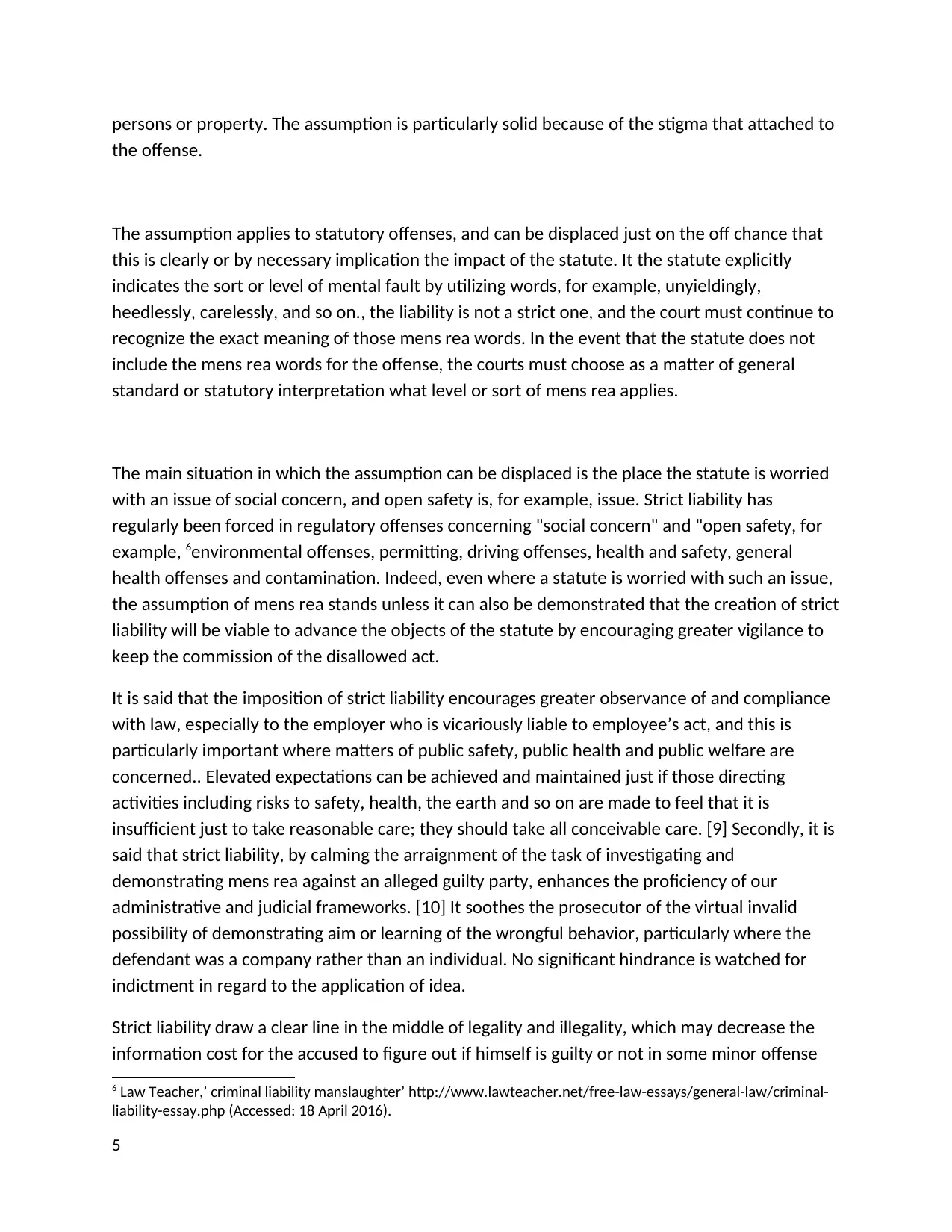
persons or property. The assumption is particularly solid because of the stigma that attached to
the offense.
The assumption applies to statutory offenses, and can be displaced just on the off chance that
this is clearly or by necessary implication the impact of the statute. It the statute explicitly
indicates the sort or level of mental fault by utilizing words, for example, unyieldingly,
heedlessly, carelessly, and so on., the liability is not a strict one, and the court must continue to
recognize the exact meaning of those mens rea words. In the event that the statute does not
include the mens rea words for the offense, the courts must choose as a matter of general
standard or statutory interpretation what level or sort of mens rea applies.
The main situation in which the assumption can be displaced is the place the statute is worried
with an issue of social concern, and open safety is, for example, issue. Strict liability has
regularly been forced in regulatory offenses concerning "social concern" and "open safety, for
example, 6environmental offenses, permitting, driving offenses, health and safety, general
health offenses and contamination. Indeed, even where a statute is worried with such an issue,
the assumption of mens rea stands unless it can also be demonstrated that the creation of strict
liability will be viable to advance the objects of the statute by encouraging greater vigilance to
keep the commission of the disallowed act.
It is said that the imposition of strict liability encourages greater observance of and compliance
with law, especially to the employer who is vicariously liable to employee’s act, and this is
particularly important where matters of public safety, public health and public welfare are
concerned.. Elevated expectations can be achieved and maintained just if those directing
activities including risks to safety, health, the earth and so on are made to feel that it is
insufficient just to take reasonable care; they should take all conceivable care. [9] Secondly, it is
said that strict liability, by calming the arraignment of the task of investigating and
demonstrating mens rea against an alleged guilty party, enhances the proficiency of our
administrative and judicial frameworks. [10] It soothes the prosecutor of the virtual invalid
possibility of demonstrating aim or learning of the wrongful behavior, particularly where the
defendant was a company rather than an individual. No significant hindrance is watched for
indictment in regard to the application of idea.
Strict liability draw a clear line in the middle of legality and illegality, which may decrease the
information cost for the accused to figure out if himself is guilty or not in some minor offense
6 Law Teacher,’ criminal liability manslaughter’ http://www.lawteacher.net/free-law-essays/general-law/criminal-
liability-essay.php (Accessed: 18 April 2016).
5
the offense.
The assumption applies to statutory offenses, and can be displaced just on the off chance that
this is clearly or by necessary implication the impact of the statute. It the statute explicitly
indicates the sort or level of mental fault by utilizing words, for example, unyieldingly,
heedlessly, carelessly, and so on., the liability is not a strict one, and the court must continue to
recognize the exact meaning of those mens rea words. In the event that the statute does not
include the mens rea words for the offense, the courts must choose as a matter of general
standard or statutory interpretation what level or sort of mens rea applies.
The main situation in which the assumption can be displaced is the place the statute is worried
with an issue of social concern, and open safety is, for example, issue. Strict liability has
regularly been forced in regulatory offenses concerning "social concern" and "open safety, for
example, 6environmental offenses, permitting, driving offenses, health and safety, general
health offenses and contamination. Indeed, even where a statute is worried with such an issue,
the assumption of mens rea stands unless it can also be demonstrated that the creation of strict
liability will be viable to advance the objects of the statute by encouraging greater vigilance to
keep the commission of the disallowed act.
It is said that the imposition of strict liability encourages greater observance of and compliance
with law, especially to the employer who is vicariously liable to employee’s act, and this is
particularly important where matters of public safety, public health and public welfare are
concerned.. Elevated expectations can be achieved and maintained just if those directing
activities including risks to safety, health, the earth and so on are made to feel that it is
insufficient just to take reasonable care; they should take all conceivable care. [9] Secondly, it is
said that strict liability, by calming the arraignment of the task of investigating and
demonstrating mens rea against an alleged guilty party, enhances the proficiency of our
administrative and judicial frameworks. [10] It soothes the prosecutor of the virtual invalid
possibility of demonstrating aim or learning of the wrongful behavior, particularly where the
defendant was a company rather than an individual. No significant hindrance is watched for
indictment in regard to the application of idea.
Strict liability draw a clear line in the middle of legality and illegality, which may decrease the
information cost for the accused to figure out if himself is guilty or not in some minor offense
6 Law Teacher,’ criminal liability manslaughter’ http://www.lawteacher.net/free-law-essays/general-law/criminal-
liability-essay.php (Accessed: 18 April 2016).
5
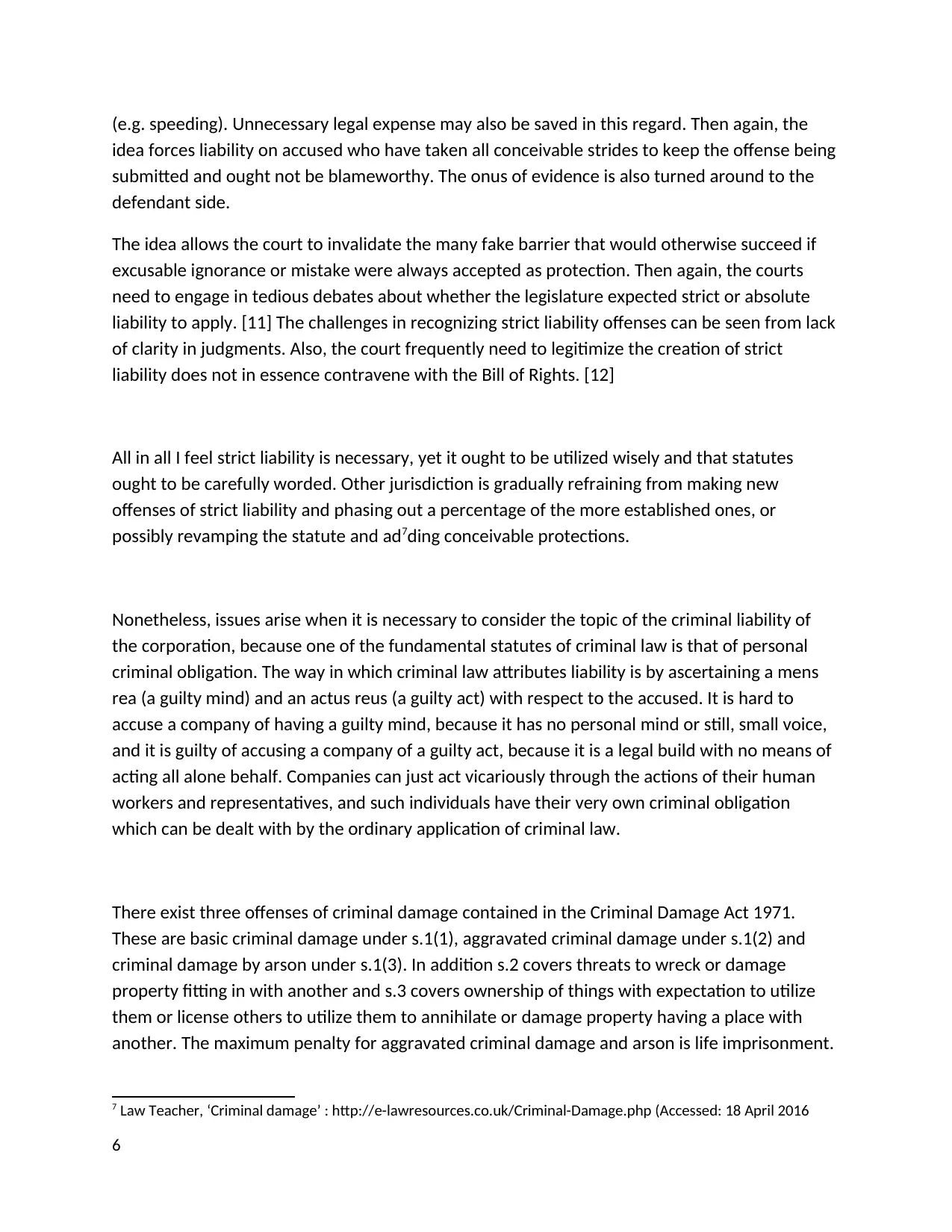
(e.g. speeding). Unnecessary legal expense may also be saved in this regard. Then again, the
idea forces liability on accused who have taken all conceivable strides to keep the offense being
submitted and ought not be blameworthy. The onus of evidence is also turned around to the
defendant side.
The idea allows the court to invalidate the many fake barrier that would otherwise succeed if
excusable ignorance or mistake were always accepted as protection. Then again, the courts
need to engage in tedious debates about whether the legislature expected strict or absolute
liability to apply. [11] The challenges in recognizing strict liability offenses can be seen from lack
of clarity in judgments. Also, the court frequently need to legitimize the creation of strict
liability does not in essence contravene with the Bill of Rights. [12]
All in all I feel strict liability is necessary, yet it ought to be utilized wisely and that statutes
ought to be carefully worded. Other jurisdiction is gradually refraining from making new
offenses of strict liability and phasing out a percentage of the more established ones, or
possibly revamping the statute and ad7ding conceivable protections.
Nonetheless, issues arise when it is necessary to consider the topic of the criminal liability of
the corporation, because one of the fundamental statutes of criminal law is that of personal
criminal obligation. The way in which criminal law attributes liability is by ascertaining a mens
rea (a guilty mind) and an actus reus (a guilty act) with respect to the accused. It is hard to
accuse a company of having a guilty mind, because it has no personal mind or still, small voice,
and it is guilty of accusing a company of a guilty act, because it is a legal build with no means of
acting all alone behalf. Companies can just act vicariously through the actions of their human
workers and representatives, and such individuals have their very own criminal obligation
which can be dealt with by the ordinary application of criminal law.
There exist three offenses of criminal damage contained in the Criminal Damage Act 1971.
These are basic criminal damage under s.1(1), aggravated criminal damage under s.1(2) and
criminal damage by arson under s.1(3). In addition s.2 covers threats to wreck or damage
property fitting in with another and s.3 covers ownership of things with expectation to utilize
them or license others to utilize them to annihilate or damage property having a place with
another. The maximum penalty for aggravated criminal damage and arson is life imprisonment.
7 Law Teacher, ‘Criminal damage’ : http://e-lawresources.co.uk/Criminal-Damage.php (Accessed: 18 April 2016
6
idea forces liability on accused who have taken all conceivable strides to keep the offense being
submitted and ought not be blameworthy. The onus of evidence is also turned around to the
defendant side.
The idea allows the court to invalidate the many fake barrier that would otherwise succeed if
excusable ignorance or mistake were always accepted as protection. Then again, the courts
need to engage in tedious debates about whether the legislature expected strict or absolute
liability to apply. [11] The challenges in recognizing strict liability offenses can be seen from lack
of clarity in judgments. Also, the court frequently need to legitimize the creation of strict
liability does not in essence contravene with the Bill of Rights. [12]
All in all I feel strict liability is necessary, yet it ought to be utilized wisely and that statutes
ought to be carefully worded. Other jurisdiction is gradually refraining from making new
offenses of strict liability and phasing out a percentage of the more established ones, or
possibly revamping the statute and ad7ding conceivable protections.
Nonetheless, issues arise when it is necessary to consider the topic of the criminal liability of
the corporation, because one of the fundamental statutes of criminal law is that of personal
criminal obligation. The way in which criminal law attributes liability is by ascertaining a mens
rea (a guilty mind) and an actus reus (a guilty act) with respect to the accused. It is hard to
accuse a company of having a guilty mind, because it has no personal mind or still, small voice,
and it is guilty of accusing a company of a guilty act, because it is a legal build with no means of
acting all alone behalf. Companies can just act vicariously through the actions of their human
workers and representatives, and such individuals have their very own criminal obligation
which can be dealt with by the ordinary application of criminal law.
There exist three offenses of criminal damage contained in the Criminal Damage Act 1971.
These are basic criminal damage under s.1(1), aggravated criminal damage under s.1(2) and
criminal damage by arson under s.1(3). In addition s.2 covers threats to wreck or damage
property fitting in with another and s.3 covers ownership of things with expectation to utilize
them or license others to utilize them to annihilate or damage property having a place with
another. The maximum penalty for aggravated criminal damage and arson is life imprisonment.
7 Law Teacher, ‘Criminal damage’ : http://e-lawresources.co.uk/Criminal-Damage.php (Accessed: 18 April 2016
6
⊘ This is a preview!⊘
Do you want full access?
Subscribe today to unlock all pages.

Trusted by 1+ million students worldwide
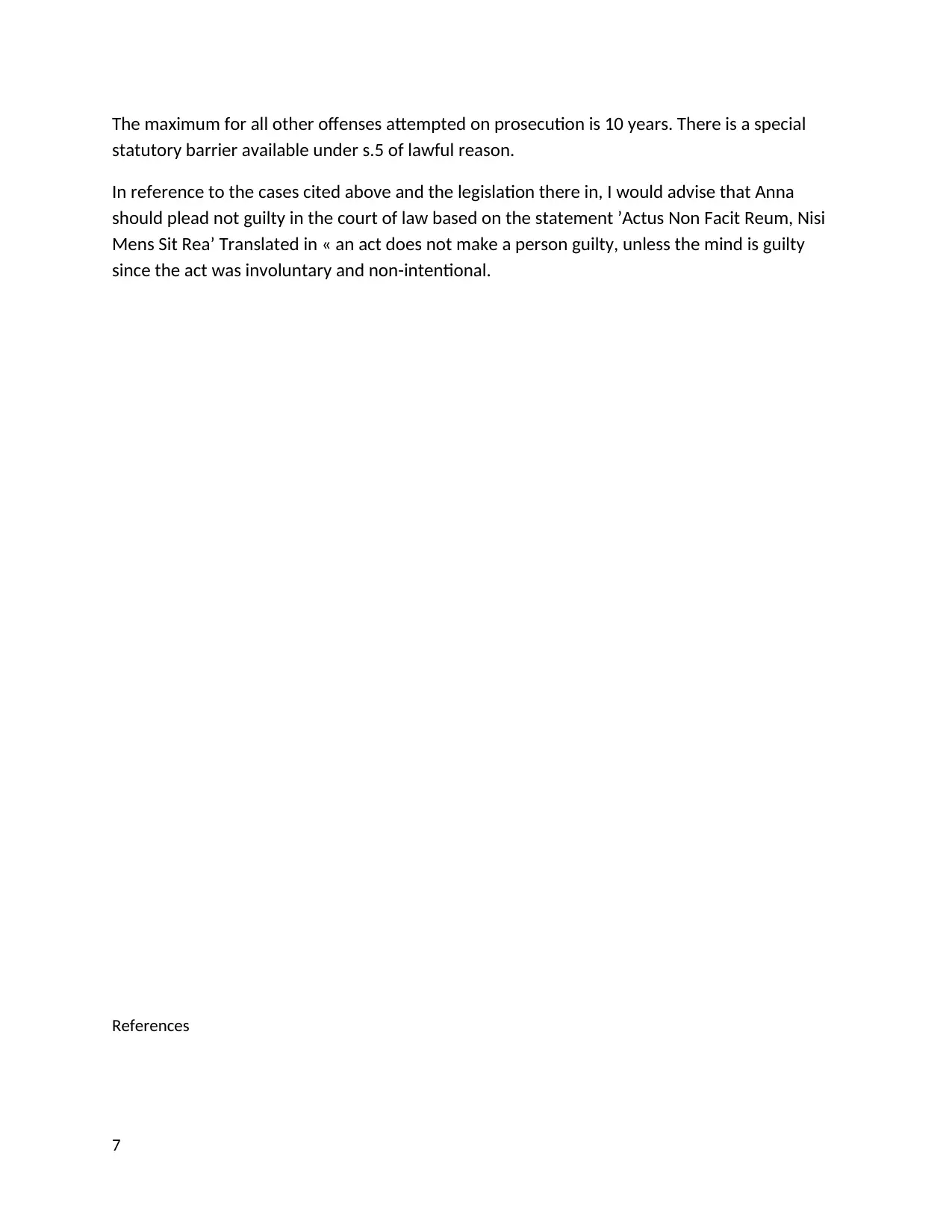
The maximum for all other offenses attempted on prosecution is 10 years. There is a special
statutory barrier available under s.5 of lawful reason.
In reference to the cases cited above and the legislation there in, I would advise that Anna
should plead not guilty in the court of law based on the statement ’Actus Non Facit Reum, Nisi
Mens Sit Rea’ Translated in « an act does not make a person guilty, unless the mind is guilty
since the act was involuntary and non-intentional.
References
7
statutory barrier available under s.5 of lawful reason.
In reference to the cases cited above and the legislation there in, I would advise that Anna
should plead not guilty in the court of law based on the statement ’Actus Non Facit Reum, Nisi
Mens Sit Rea’ Translated in « an act does not make a person guilty, unless the mind is guilty
since the act was involuntary and non-intentional.
References
7
Paraphrase This Document
Need a fresh take? Get an instant paraphrase of this document with our AI Paraphraser
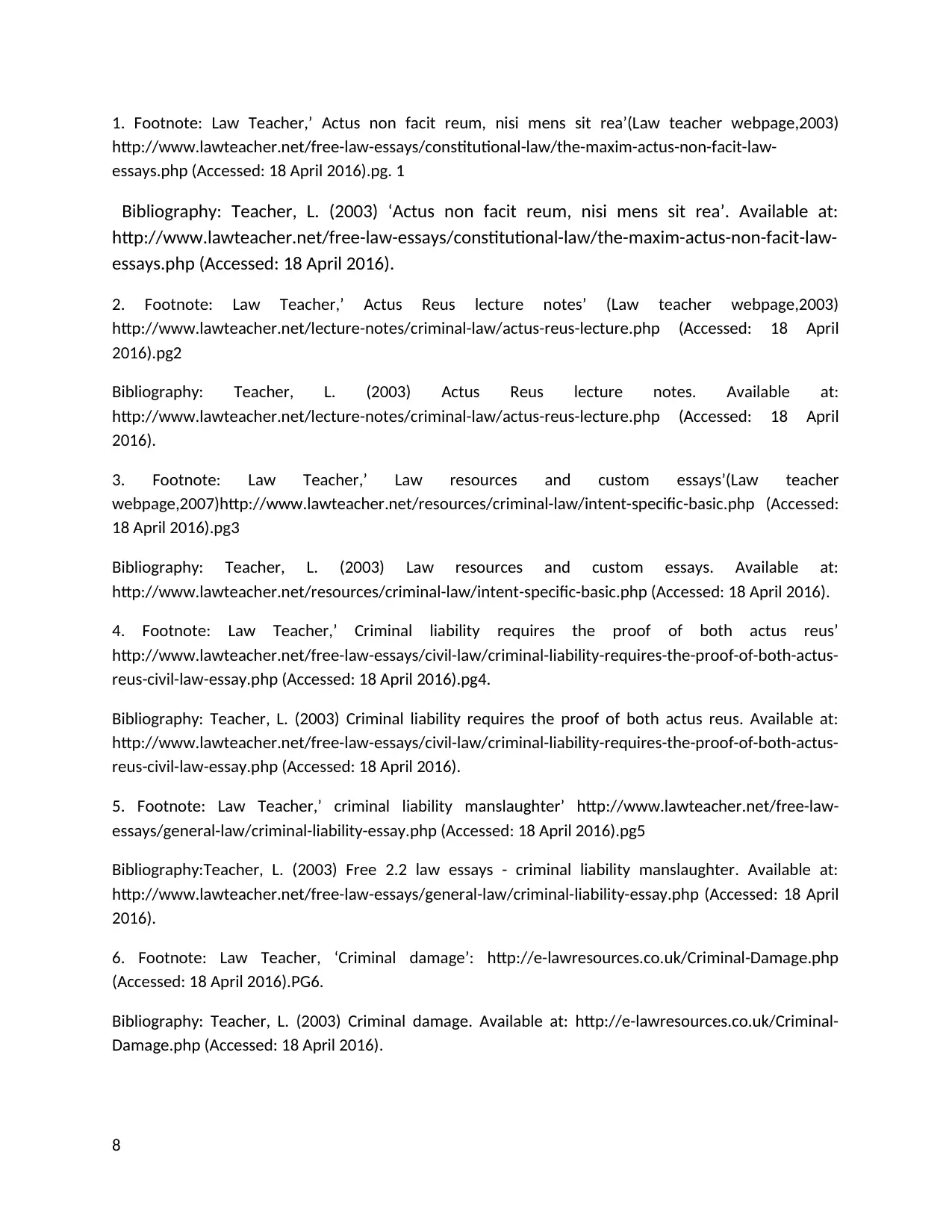
1. Footnote: Law Teacher,’ Actus non facit reum, nisi mens sit rea’(Law teacher webpage,2003)
http://www.lawteacher.net/free-law-essays/constitutional-law/the-maxim-actus-non-facit-law-
essays.php (Accessed: 18 April 2016).pg. 1
Bibliography: Teacher, L. (2003) ‘Actus non facit reum, nisi mens sit rea’. Available at:
http://www.lawteacher.net/free-law-essays/constitutional-law/the-maxim-actus-non-facit-law-
essays.php (Accessed: 18 April 2016).
2. Footnote: Law Teacher,’ Actus Reus lecture notes’ (Law teacher webpage,2003)
http://www.lawteacher.net/lecture-notes/criminal-law/actus-reus-lecture.php (Accessed: 18 April
2016).pg2
Bibliography: Teacher, L. (2003) Actus Reus lecture notes. Available at:
http://www.lawteacher.net/lecture-notes/criminal-law/actus-reus-lecture.php (Accessed: 18 April
2016).
3. Footnote: Law Teacher,’ Law resources and custom essays’(Law teacher
webpage,2007)http://www.lawteacher.net/resources/criminal-law/intent-specific-basic.php (Accessed:
18 April 2016).pg3
Bibliography: Teacher, L. (2003) Law resources and custom essays. Available at:
http://www.lawteacher.net/resources/criminal-law/intent-specific-basic.php (Accessed: 18 April 2016).
4. Footnote: Law Teacher,’ Criminal liability requires the proof of both actus reus’
http://www.lawteacher.net/free-law-essays/civil-law/criminal-liability-requires-the-proof-of-both-actus-
reus-civil-law-essay.php (Accessed: 18 April 2016).pg4.
Bibliography: Teacher, L. (2003) Criminal liability requires the proof of both actus reus. Available at:
http://www.lawteacher.net/free-law-essays/civil-law/criminal-liability-requires-the-proof-of-both-actus-
reus-civil-law-essay.php (Accessed: 18 April 2016).
5. Footnote: Law Teacher,’ criminal liability manslaughter’ http://www.lawteacher.net/free-law-
essays/general-law/criminal-liability-essay.php (Accessed: 18 April 2016).pg5
Bibliography:Teacher, L. (2003) Free 2.2 law essays - criminal liability manslaughter. Available at:
http://www.lawteacher.net/free-law-essays/general-law/criminal-liability-essay.php (Accessed: 18 April
2016).
6. Footnote: Law Teacher, ‘Criminal damage’: http://e-lawresources.co.uk/Criminal-Damage.php
(Accessed: 18 April 2016).PG6.
Bibliography: Teacher, L. (2003) Criminal damage. Available at: http://e-lawresources.co.uk/Criminal-
Damage.php (Accessed: 18 April 2016).
8
http://www.lawteacher.net/free-law-essays/constitutional-law/the-maxim-actus-non-facit-law-
essays.php (Accessed: 18 April 2016).pg. 1
Bibliography: Teacher, L. (2003) ‘Actus non facit reum, nisi mens sit rea’. Available at:
http://www.lawteacher.net/free-law-essays/constitutional-law/the-maxim-actus-non-facit-law-
essays.php (Accessed: 18 April 2016).
2. Footnote: Law Teacher,’ Actus Reus lecture notes’ (Law teacher webpage,2003)
http://www.lawteacher.net/lecture-notes/criminal-law/actus-reus-lecture.php (Accessed: 18 April
2016).pg2
Bibliography: Teacher, L. (2003) Actus Reus lecture notes. Available at:
http://www.lawteacher.net/lecture-notes/criminal-law/actus-reus-lecture.php (Accessed: 18 April
2016).
3. Footnote: Law Teacher,’ Law resources and custom essays’(Law teacher
webpage,2007)http://www.lawteacher.net/resources/criminal-law/intent-specific-basic.php (Accessed:
18 April 2016).pg3
Bibliography: Teacher, L. (2003) Law resources and custom essays. Available at:
http://www.lawteacher.net/resources/criminal-law/intent-specific-basic.php (Accessed: 18 April 2016).
4. Footnote: Law Teacher,’ Criminal liability requires the proof of both actus reus’
http://www.lawteacher.net/free-law-essays/civil-law/criminal-liability-requires-the-proof-of-both-actus-
reus-civil-law-essay.php (Accessed: 18 April 2016).pg4.
Bibliography: Teacher, L. (2003) Criminal liability requires the proof of both actus reus. Available at:
http://www.lawteacher.net/free-law-essays/civil-law/criminal-liability-requires-the-proof-of-both-actus-
reus-civil-law-essay.php (Accessed: 18 April 2016).
5. Footnote: Law Teacher,’ criminal liability manslaughter’ http://www.lawteacher.net/free-law-
essays/general-law/criminal-liability-essay.php (Accessed: 18 April 2016).pg5
Bibliography:Teacher, L. (2003) Free 2.2 law essays - criminal liability manslaughter. Available at:
http://www.lawteacher.net/free-law-essays/general-law/criminal-liability-essay.php (Accessed: 18 April
2016).
6. Footnote: Law Teacher, ‘Criminal damage’: http://e-lawresources.co.uk/Criminal-Damage.php
(Accessed: 18 April 2016).PG6.
Bibliography: Teacher, L. (2003) Criminal damage. Available at: http://e-lawresources.co.uk/Criminal-
Damage.php (Accessed: 18 April 2016).
8

9
⊘ This is a preview!⊘
Do you want full access?
Subscribe today to unlock all pages.

Trusted by 1+ million students worldwide
1 out of 9
Related Documents
Your All-in-One AI-Powered Toolkit for Academic Success.
+13062052269
info@desklib.com
Available 24*7 on WhatsApp / Email
![[object Object]](/_next/static/media/star-bottom.7253800d.svg)
Unlock your academic potential
Copyright © 2020–2025 A2Z Services. All Rights Reserved. Developed and managed by ZUCOL.





